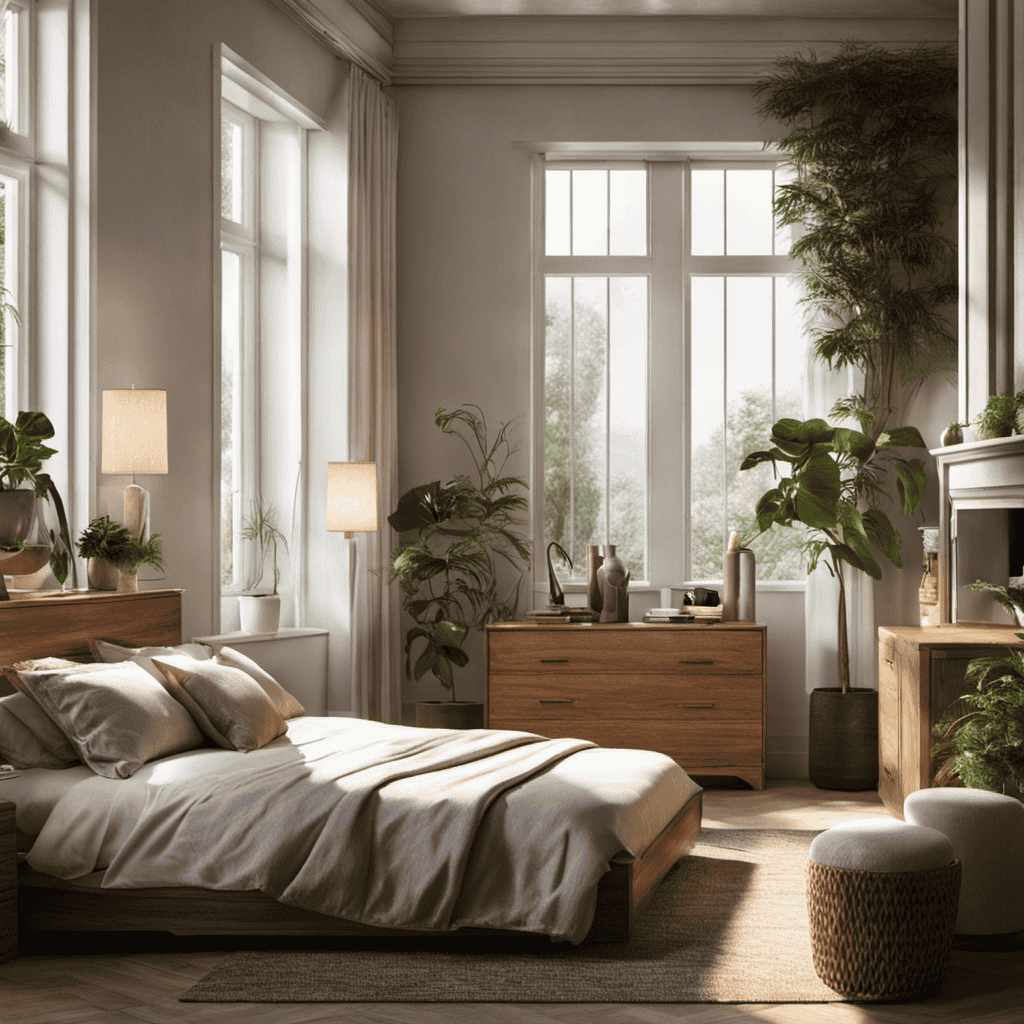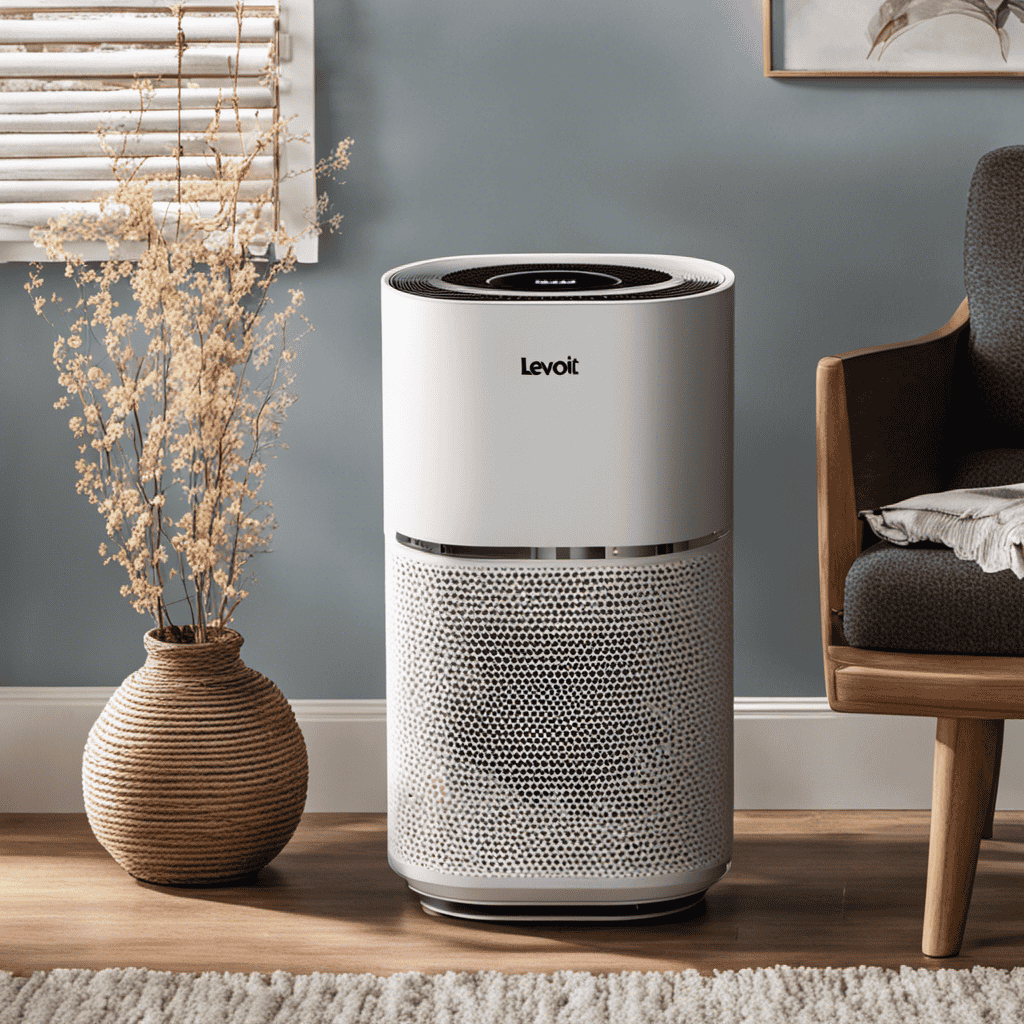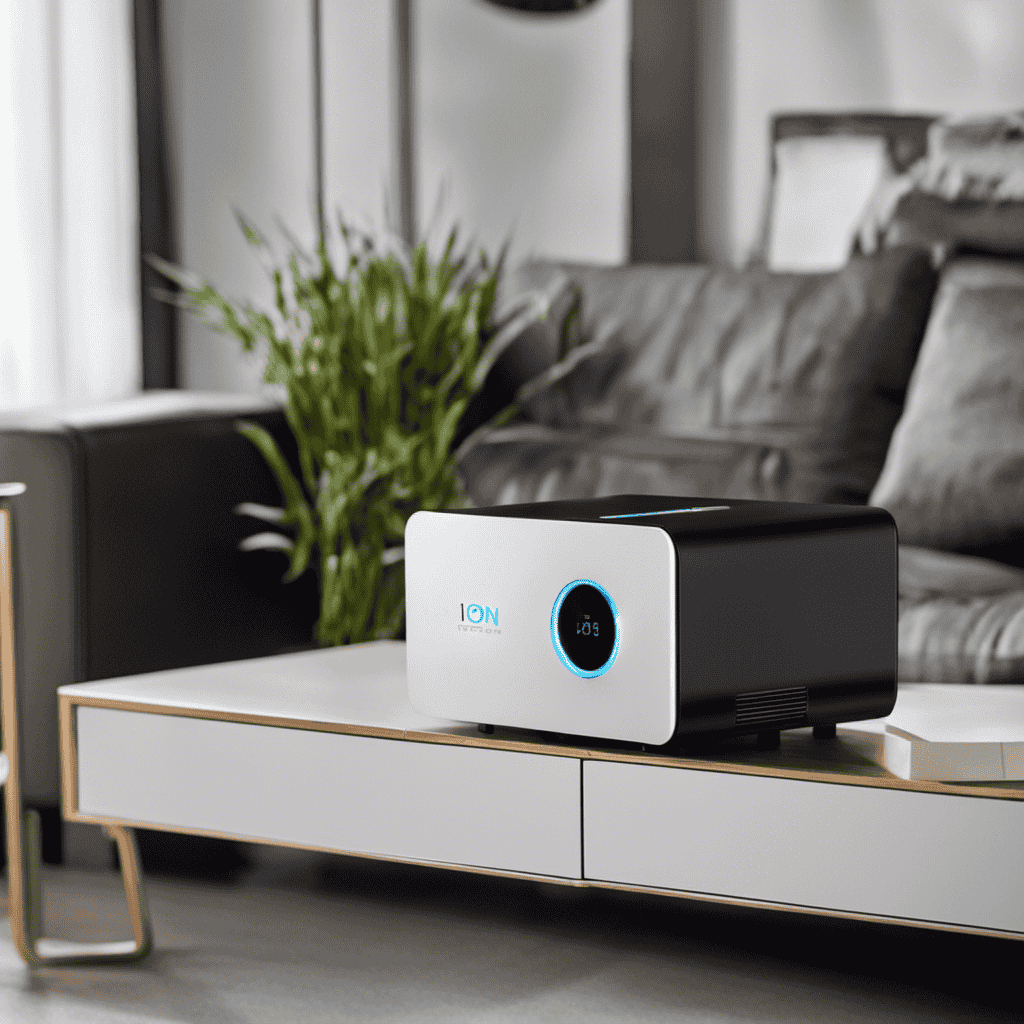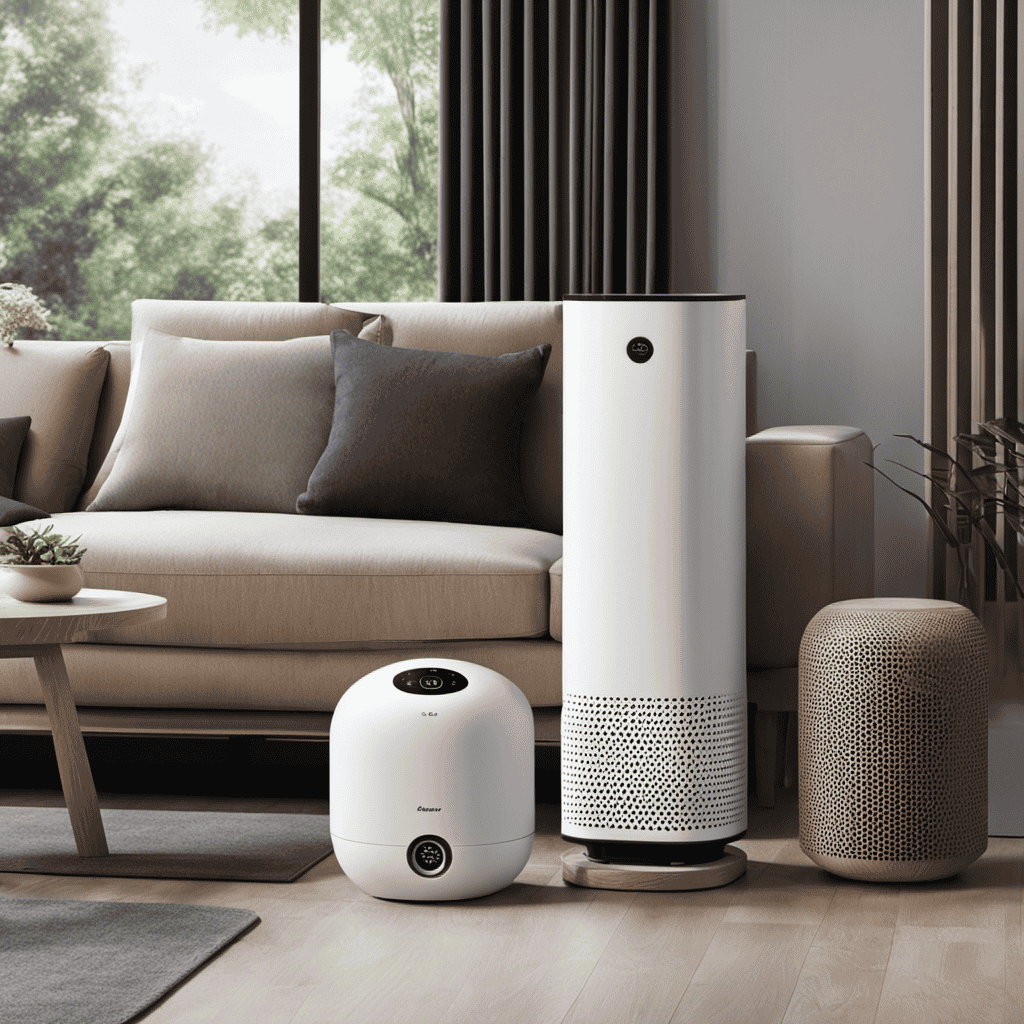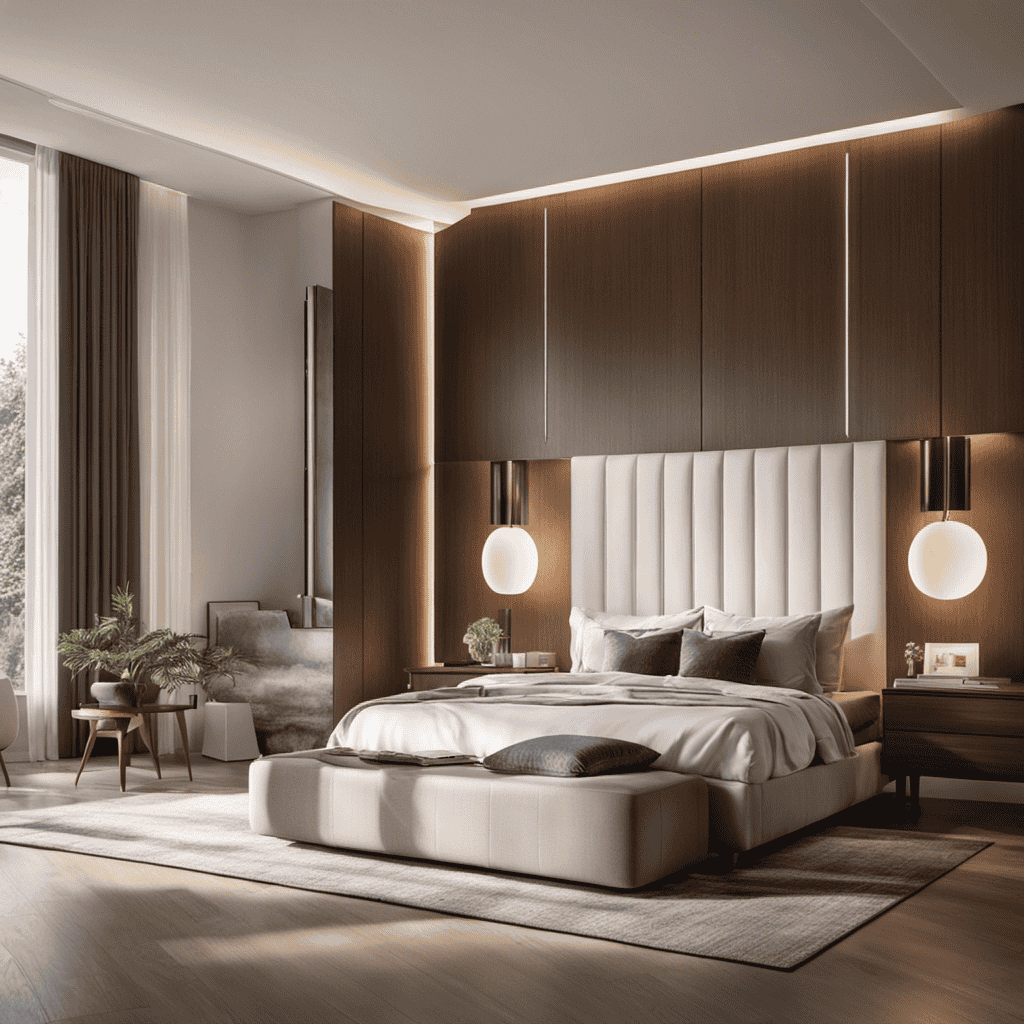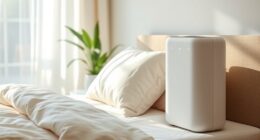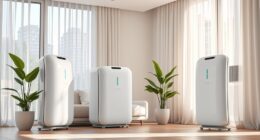As a person who cares about clean air and the health of my family, I frequently ask myself, “How long should I run my air purifier?” This is a common question, and in this article, I will share evidence-based answers with you.
We will explore the factors to consider, recommended operating time, adjusting for room size, nighttime usage, and the benefits of continuous versus intermittent use.
Let’s dive in and discover how to optimize the lifespan of your air purifier for cleaner, fresher air.
Key Takeaways
- Room ventilation greatly affects the effectiveness of an air purifier.
- Recommended operating time varies based on factors such as room size, air quality, and personal needs.
- Adjust the operating time based on pollution levels and specific requirements.
- Regular cleaning and maintenance are essential for extending the lifespan of an air purifier.
Factors to Consider
When deciding how long to keep the air purifier on, you should consider various factors.
One important factor is room ventilation. The effectiveness of an air purifier greatly depends on the air circulation in the room. If the room is poorly ventilated, it may take longer for the purifier to clean the air.
Another factor to consider is air quality standards. Different environments have different air quality requirements. For example, if you live in an area with high pollution levels, you may need to run the air purifier for longer periods of time to maintain clean air. It is essential to refer to local air quality standards to determine the appropriate duration.
Taking these factors into account, it is crucial to find the right balance to ensure optimal air purification without unnecessary energy consumption.
Now, let’s move on to the recommended operating time.
Recommended Operating Time
You can follow the recommended operating time for the air purifier to ensure optimal performance and clean air in your home. The recommended operating time is dependent on factors such as room ventilation and air quality assessment. By considering these factors, you can determine how long the air purifier should be on to effectively filter and purify the air in your space.
To help you understand the recommended operating time better, I have included a table below that outlines the general guidelines based on room size and air quality assessment:
| Room Size | Air Quality Assessment | Recommended Operating Time |
|---|---|---|
| Small (up to 150 sq ft) | Poor to Fair | 4-6 hours per day |
| Medium (150-300 sq ft) | Fair to Good | 8-10 hours per day |
| Large (300-500 sq ft) | Good to Excellent | 12-16 hours per day |
| Extra Large (500+ sq ft) | Excellent | 24 hours per day |
Adjusting for Room Size
When it comes to ensuring optimal air purification, two key factors to consider are the purification time and the size of the room. Determining the optimal purification time is crucial in order to effectively remove pollutants from the air without wasting energy.
Additionally, room size is a critical consideration as it directly affects the air purifier’s ability to clean the air efficiently and thoroughly. By understanding the relationship between purification time and room size, we can make informed decisions to create a healthier environment.
Optimal Purification Time
To maximize the effectiveness of your air purifier, it’s best to keep it running for at least 8 hours a day. This ensures that the air in your home or office is continuously filtered and purified, providing you with the maximum health benefits.
Research has shown that air purifiers can significantly improve indoor air quality, reducing the presence of allergens, pollutants, and even airborne viruses. By running the purifier for a sufficient amount of time, you can experience improved respiratory health, reduced allergy symptoms, and a generally cleaner living environment.
However, it’s important to consider energy consumption when running the air purifier for extended periods. Look for energy-efficient models and consider using the purifier only when you’re in the room, or using a timer to avoid unnecessary energy usage.
Room Size Considerations
One important factor to consider when choosing an air purifier is the size of the room you plan to use it in. The effectiveness of an air purifier depends on its ability to circulate and filter the air in the given space. A room with a larger square footage will require a more powerful air purifier to ensure optimal air quality. To determine the appropriate size, you can refer to the manufacturer’s guidelines or use a simple calculation based on the room’s dimensions. Here is an example of a table that illustrates the recommended air purifier size based on room size:
| Room Size (Square Feet) | Recommended Air Purifier Size (CADR) |
|---|---|
| Up to 100 | 60-100 |
| 100-300 | 100-150 |
| 300-500 | 150-200 |
| 500+ | 200+ |
Nighttime Usage
It’s important to consider nighttime usage when deciding how long the air purifier should be on. Safety precautions should be taken into account to ensure that the air purifier is used properly and does not pose any risks.
Potential health benefits of using an air purifier at night include improved air quality, reduced allergy symptoms, and better respiratory health. However, it is essential to follow the manufacturer’s instructions and guidelines for safe usage.
Some air purifiers are designed specifically for nighttime use, with features like silent mode or dimmed lights to avoid disturbance while sleeping. Additionally, it’s recommended to keep the bedroom door closed and allow sufficient time for the air purifier to circulate clean air before going to bed.
Transitioning into the next section, let’s now explore the continuous vs. intermittent use of air purifiers.
Continuous Vs. Intermittent Use
When deciding how to use your air purifier, you need to consider whether you want to use it continuously or intermittently. Both methods have their advantages and drawbacks.
Continuous usage ensures that the air in your home is constantly being filtered, providing a consistently clean environment. However, this also means that the purifier will be consuming energy continuously, resulting in higher electricity bills.
On the other hand, intermittent usage allows you to conserve energy by only running the purifier when needed. This can be especially useful if you only need the purifier during certain times of the day or in specific rooms. By comparing the energy consumption of both methods, you can decide which option best suits your needs and budget.
Transitioning into the next section, let’s explore ways to extend the lifespan of your air purifier.
Extending the Lifespan of Your Air Purifier
In order to extend the lifespan of your air purifier, it is important to follow some maintenance tips.
Regular cleaning is crucial to keep the filters and internal components of the purifier in good condition. Most air purifiers come with a user manual that provides specific instructions on how to clean and maintain the device.
It is recommended to clean the filters at least once every three months, or more frequently if you live in an area with high levels of air pollutants.
Additionally, keeping the air purifier in a well-ventilated area can help prevent the accumulation of dust and debris.
Another important aspect to consider is the energy consumption of your air purifier.
Choosing an energy-efficient model and using it only when necessary can help reduce energy consumption and prolong the lifespan of the device.
Frequently Asked Questions
Can I Use My Air Purifier in Multiple Rooms Simultaneously?
Yes, you can use your air purifier in multiple rooms simultaneously. It increases air quality and reduces allergens. Using an air purifier at night promotes better sleep, and it also benefits by purifying the air in your car.
Should I Turn off My Air Purifier When I Leave the House?
I keep my air purifier on all day and use it at night while I sleep. It helps remove pollutants and allergens from the air, creating a cleaner and healthier environment for me.
Is It Safe to Use an Air Purifier Around Pets and Children?
Yes, it is safe to use an air purifier around pets and children. Air purifiers are effective at removing pollutants and allergens, but it’s important to choose one with a HEPA filter and regularly maintain it to minimize potential risks.
Can I Use an Air Purifier in a Room With Open Windows?
Using an air purifier with open windows is like trying to fill a bucket with a hole in it. It may not be as effective in removing pollutants and allergens.
How Often Should I Clean or Replace the Filters in My Air Purifier?
To maintain optimal air quality, I clean my air purifier filters every 3-6 months or as recommended by the manufacturer. Signs that filters need replacement include reduced airflow, unpleasant odors, or visible dirt accumulation.
Conclusion
In conclusion, determining the optimal duration for running your air purifier depends on various factors such as room size, air quality, and personal preferences.
To ensure effective air purification, it is recommended to operate the device continuously or for at least 4-6 hours daily. Consider adjusting the usage time based on room size, with larger spaces requiring longer operation.
Additionally, nighttime usage can enhance sleep quality by reducing allergens and pollutants.
By using your air purifier wisely, you can extend its lifespan and create a clean and healthy environment metaphorically akin to a breath of fresh air in your home.
